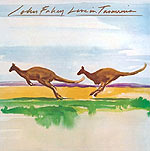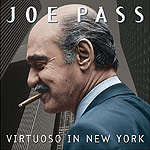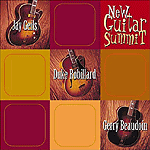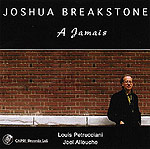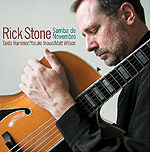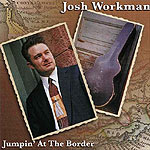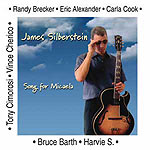
Six-strings galore
|
These reviews first appeared in the Autumn 2004 issue of Turbula.
While most folks credit the rise of the modern guitar hero to, say, Chuck Berry or the latter Eric Clapton and Jeff Beck, the two men most responsible for the guitar as a solo, starring instrument in the non-classical, non-Iberian world are probably John Fahey and Joe Pass.
Pass was the consummate jazz virtuoso – a man able to trade passages with piano great Oscar Peterson. Fahey was the ultimate nonconformist folkie.
Both were able to create a sound as full and complete as an entire band with just a single acoustic guitar.
And while while both men often played in ensemble environments, both were at their best alone with their guitar.
Fahey by all accounts single-handedly invented the genre of the acoustic guitar solo folk artist; a genre that later made Windham Hill into a major force in new age music.
But as demonstrated on a newly issued live album recorded in Tasmania a quarter-century ago, Fahey's music was no introspective navel-gazing – a Fahey concert was much like a Fahey studio session, in that each was an intensely creative venture with solos that simultaneously take in jazz, blues, classical and folk.
His playing is idiosyncratic, complex, often dissonant and just plain weird. But so much of it is also brilliant that despite its oddness it's easy to hear why people on the southern Australian island of Tasmania had heard of this American and filled a concert hall to hear his music in person.
Fahey's iconoclastic nature means that there are few live recordings of his performances for his fans; what further sets this release apart is the fact that he speaks to the audience for about a minute and a half about Tasmania's reputation in the States – a veritable speech for him.
In contrast to Fahey's bizarreness, the music of Joe Pass is immediately accessible. Like his friend and frequent musical cohort Count Basie, Pass played a brand of music that is equally mainstream and sophisticated.
In the previously unreleased sessions on "Virtuoso in New York," Pass was recorded solo by Norman Granz over two days in June 1975. The material is standard Pass – "The Way You Look Tonight," "When Your Lover Has Gone," "(I Don't Stand) A Ghost of a Chance (With You)," with a few originals from Pass' pen.
The performance is also standard Pass – in other words, brilliant. He picks the lead while simultaneously strumming harmony and creates the rhythm from both. Arpeggios intermingle with chords that mix with picked melodic solos. Nobody has ever created a sound like Joe Pass on guitar. It continues to amaze how so much could be going on on just one instrument.
Jay Geils remains best known as founder and namesake of the popular 1970s and '80s mainstream rock act, the J. Geils Band. But like fellow '70s arena rocker Steve Miller, Geils has one foot – as well as his heart – in the jazz world.
Teaming up with blues/swing guitarist Duke Robillard (who earned his rep as a member of Roomful of Blues) and straight-ahead jazzster Gerry Beaudoin, Geils has put out "New Guitar Summit." And it is more of a summit than a shoot-out. Unlike, say, the blues powerhouse guitar assembly, "Showdown!", there is no one-upmanship here, no throwing down of challenges. But that lack of competitive strutting doesn't mean there aren't creative juices flowing here.
Geils, Robillard and Beaudoin are more like an a capella vocal band in the way they support each other musically. With three hollow-body electric guitars, there is a very warm sense of harmony and interplay throughout this album. The solos are wonderfully imaginative, and it sounds as if some are even started by one member and finished by another.
The sound and approach are of classic swing and straight-ahead jazz – it's definitely of the Herb Ellis/Barney Kessel school. Interestingly, three of the songs are originals by Beaudoin, yet they fight right in with the covers of Benny Goodman, Eddie "Cleanhead" Vinson and George Gershwin.
Kvetch? Neither Robillard nor Beaudoin sings nearly as well as he plays; if this remarkable trio reunites for another album, they might want to just skip the vocals.
Joshua Breakstone has much of the fluidity and grace of Pass, and a not dissimilar tone. And surely it's no knock on Breakstone to point out that if he does not have Pass' economy of notes, nor his imagination, he nevertheless possesses a very nice musical voice.
Breakstone's new collection, "A Jamais," features him leading a trio on his hollow-body guitar (thus the tone like Pass') through nine cuts; on two songs, he plays solo. Most of the songs are originals by Breakstone, with only the solo reading of Bud Powell's "Hallucinations" not from his own pen.
If not immediately memorable, Breakstone's songs are pleasant and give him and his trio lots of room for their tasteful, imaginative solos. (And "Tomorrow's Hours" is a wonderful song, with a seductive melody line that will stick in your head.)
While his tone is pure fat-body jazz guitar, Rick Stone borrows heavily from blues players on his latest recording, "Samba de Novembro." Oh, you'll not confuse him for Lightnin' Hopkins – but in the way he plays around with chords as much as melodic leads, actually working the chords into his solos as an organic part of them, there is more than a bit of Fenton Robinson to be heard.
Stone and his quartet work through an even dozen songs, ranging from standards ("I Can't Get Started," "My Romance") to covers of forgotten gems (Kenny Werner's "Autumn in Three," Bill Evans' "Song for Helen") to a half-dozen originals by Stone and/or his band.
The arrangements are breezy, sunny and fun, with pianist Tardo Hammer even working a riff from the theme from the TV show "The Munsters" into his solo on "Duck, Duck, Blues!"
Josh Workman's new CD, "Jumpin' at the Border," really ought to have been titled, "Jumpin' Across All Kinds of Borders." It's tough to think of another recording that takes in so much musical territory in its song selection. From Dizzy and Miles to Brazil's Pixinguinha to lush standards to a gypsy ode, Workman and his varying ensembles tackle just about anything that can be played.
Workman himself is a musical and spiritual descendent of Kessel's hollow-body brand of swing electric guitar – well, at least on his own songs and the standards. On the Brazilian songs, he plays a Spanish acoustic classical guitar with a definite feel for the Iberian style; you can hear flamenco and fado interwoven with the Brazilian themes and rhythms.
Regardless of the style or setting, though, Workman's solos are crisp and original, his playing straight-up and confident.
James Silberstein's album features his guitar playing prominently, but within an ensemble environment. But when you've got Randy Brecker sitting in on trumpet, Eric Alexander on tenor sax and Bruce Barth on keyboards, you'd be a fool not to share that lead mic.
It's a fairly straight-ahead set, at times wholly accessible, even pop-ish, at other times very hardcore jazz. Everything is anchored by a nice, lilting swing.
Silberstein himself plays with a spare touch on his hollow-body guitar. It's a wholly modern sound, informed as much by Wes Montgomery and Pat Martino. But his tone is sharper than theirs, not quite as warm.
Still, he's an imaginative soloist and his original compositions stand up quite nicely to the covers of "How Deep is the Ocean," "Love for Sale" and "Nica's Dream."
